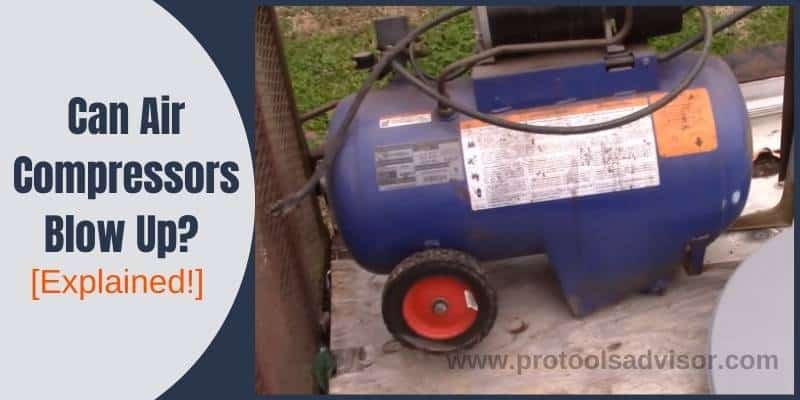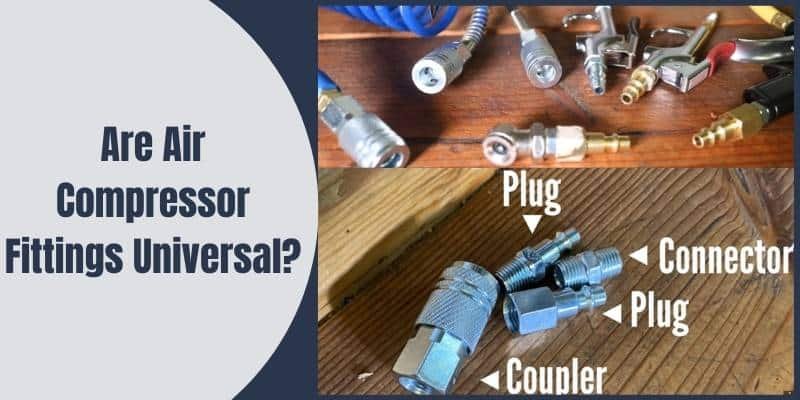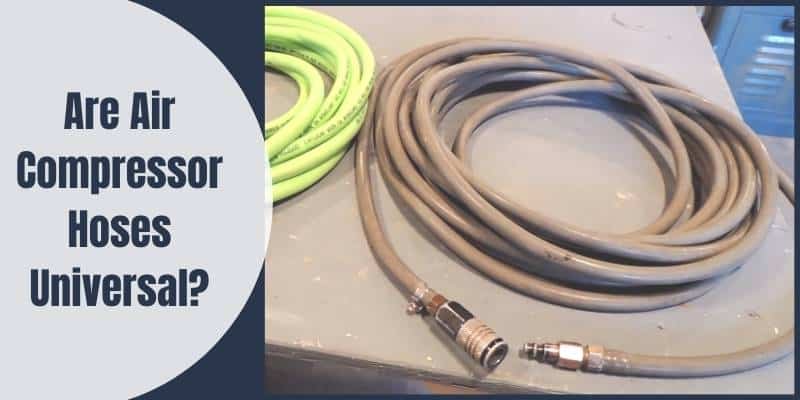Disclosure: This post contains affiliate links and I will be compensated if you make a purchase after clicking through my links. Learn More
An air compressor is a device that uses an electric motor or gas engine to power a piston that compresses air. The compressed air is then used to power tools, inflate tires, and operate other equipment.
Smaller, portable air compressors are used for operating pneumatic tools and inflating tires. Larger air compressors are used to power industrial machinery such as rock breakers and jackhammers.
Can Air Compressors Blow Up?
The short answer is, yes, air compressors have the potential to explode, but such incidents are rare and often preventable through proper maintenance and operation.
While air compressors are generally safe to use, there is always the potential for them to explode. If an air compressor is not properly maintained, the build-up of heat and pressure can cause the unit to explode.
This can be extremely dangerous, so it’s important to make sure your air compressor is always in good working condition.
In this article, we took a holistic approach to address the question, “Can air compressors blow up?” We began by discussing the types of accidents that could happen with your air compressor, and then moved on to the causes of its explosion, possible preventions, and so on. Let’s get started!

Types of Air Compressor Accidents
There are many different types of accidents that can occur when using an air compressor. The most common type of accident is when the air compressor explodes. This can happen for several reasons, such as if the air tank is overfilled, if the motor overheats, or if there is a leak in the tank.
If an explosion does occur, it can cause serious injuries or even death to those nearby. Another type of accident that can occur is called an “air embolism”. This happens when compressed air enters the bloodstream through a cut or puncture wound.
Air embolisms can be very dangerous and even fatal. To avoid these kinds of accidents, it is important to always follow the manufacturer’s instructions when using an air compressor. Be sure to check the pressure gauge frequently, and never overfill the tank.
If you notice any strange noises coming from the compressor, shut it off immediately and have it checked by a professional before using it again.
How Does an Air Compressor Explode?
It all has to do with the way that air compressors work. They take in air at atmospheric pressure and then compress it by reducing the volume of the chamber. This increase in pressure can cause the metal walls of the chamber to weaken and eventually fail, leading to an explosion. So why don’t all air compressors explode?
It turns out that there are two main factors that contribute to whether or not an air compressor will explode. The first is the quality of the materials used to build the compressor. The second is how well-maintained the compressor is.
If you want to reduce the risk of your air compressor exploding, it’s important to make sure that it’s made with high-quality materials and that it’s regularly serviced and maintained.
Reasons for an Air Compressor to Explode
Build-up of Excessive Heat
The most common cause of an exploding air compressor is a build-up of excessive heat inside the unit. If the air compressor is not properly ventilated, the heat can build up to the point where it ignites the oil and other combustible materials inside the unit, causing an explosion.
Air Compressor Tank Failure
An air compressor tank failure can be a serious problem for any business that relies on compressed air. There are a number of reasons why an air compressor tank might fail, and the consequences can be disastrous. A sudden loss of compressed air can shut down production lines, cause safety hazards, and lead to costly repairs.
Rupture or Leak: The most common type of air compressor tank failure is a rupture or leak. This can happen due to corrosion, metal fatigue, or even just wear and tear over time. When a tank ruptures, it releases all of the stored compressed air very quickly, potentially damaging nearby equipment and causing the tank to collapse.
Gradual Leaks: Leaks are less dramatic than ruptures but can still be problematic. A small leak might not seem like a big deal, but it can gradually empty the storage tank over time, leading to production shutdowns or other problems. Leaks can also be dangerous because they might allow flammable liquids or gases to escape from the tank into the workplace, posing a fire or explosion hazard.
Damaged or Clogged Air Filter
An air compressor can also explode if its air filter is left damaged or clogged. This means unfiltered air containing abrasive particles will enter the system, which will wear down the pistons and other moving parts slowly. If the filter is not replaced for a long time, there is a chance that the piston will grind against the friction-generating parts in its lubricant. This will cause the pressure inside the cylinder to rise above the normal level, and when it prevails, the tank could eventually explode.
Sudden Release of Pressure:
Another possible cause of an exploding air compressor is a sudden release of pressure. If the pressure relief valve fails, the resulting release of pressure can cause an explosion.
Some Additional Reasons for Air Compressor Explosions
Rust Tank
Rust formation on critical components of the air compressor, especially in the tank or internal parts, can weaken the structure and lead to a higher risk of explosions. Rust compromises the integrity of the equipment and makes it more susceptible to failure.
Read More: How to keep an air compressor tank from rusting?
Excessive Pressure
Operating the air compressor beyond its maximum pressure limits can overload the system, making it prone to catastrophic failures and potential explosions. It is crucial to adhere to the manufacturer’s recommended pressure ratings for safe operation.
Lubricant Problems
Issues with the lubrication system can result in inadequate lubrication of moving parts, leading to increased friction and heat generation. This, in turn, can contribute to a higher likelihood of an explosion if the heat is not adequately dissipated.
Manufacturer Defects
Defects in the design, construction, or assembly of the air compressor can create weaknesses or vulnerabilities that may lead to malfunctions or sudden failures, potentially causing explosions. Regular quality checks and adherence to industry standards are essential to minimize the risk of manufacturer-related issues.
Air Compressor Tune Up: Reducing the Risks
If you own an air compressor, it’s important to keep it in good working condition. That means regular tune-ups! A well-maintained air compressor will last longer and prevent it from being blown up.
So what does a tune-up involve? Here are the basics:
1. Cleaning the unit – This is probably the most important step in a tune-up. Over time, dust and debris can build up inside your air compressor, causing it to work less efficiently. A good cleaning will remove all of this buildup and help your unit run more smoothly.
2. Checking the oil level – Just like with your car, it’s important to check the oil level in your air compressor regularly. If the oil is low, add more until it reaches the full line on the dipstick.
3. Replacing the air filter – The air filter keeps contaminants out of your air compressor’s internals. Over time, it can become clogged with dirt and dust, reducing its effectiveness. Replacing it regularly will ensure that your unit is getting clean, filtered air.
4. Inspecting hoses and connections – Any cracks or leaks in hoses or connections can lead to big problems down the road.
5. Replacing compressor belt – Checking and replacing your air compressor belt drive is also an important step. If the belt is loose or worn out, it can slip off the pulley while in motion, resulting in extra friction and heat buildup.
Don’t Do These with Your Air Compressor
There are a few things that you should not do with an air compressor. First, you should not use an air compressor to fill up a gas tank. Second, you should not use an air compressor to power tools that are not designed for use with one. Third, you should not use an air compressor to clean your house or blow up inflatable toys. Finally, you should not leave your air compressor running when it is not in use.
To Summarize, Can Air Compressors Blow Up?
Coming to the end, we hope you have got a detail insight into the question, “can air compressors blow up?’”
In short, yes, an air compressor can blow up. However, there are certain conditions that must be met for this to happen. For example, if the air compressor is over-pressurized, has a defective pressure relief valve, or is used to compress explosive gasses, then it could explode. While explosions are rare, they can cause serious injury or even death. Therefore, it’s important to follow all safety precautions when using an air compressor.
Investigate the video of the exploded air compressor.
Common FAQs About Air Compressor Explosions
Can I leave my air compressor running unattended?
It is generally not recommended to leave an air compressor running unattended to avoid potential hazards. Always supervise the compressor during operation.
How often should I inspect my air compressor?
Regular inspections should be conducted at least every three months or as specified by the manufacturer. Additionally, perform a visual check before each use.
What should I do if my safety valve malfunctions?
If the safety valve is not working correctly, replace it immediately to prevent pressure buildup. Avoid using the compressor until the valve is replaced.
Can using a higher pressure rating for my air compressor improve performance?
No, using a higher pressure rating than recommended can be dangerous and may lead to an explosion. Always operate the compressor within the recommended pressure range.
Are there any signs that my air compressor is overheating?
Yes, common signs include strange noises, excessive vibrations, and the unit shutting down unexpectedly. If you notice any of these signs, turn off the compressor and let it cool before investigating further.
Can air compressor explosions be completely avoided with proper maintenance?
While proper maintenance significantly reduces the risk of explosions, unforeseen circumstances can still occur. Regular maintenance, proper training, and following safety guidelines are crucial for minimizing the risk.








